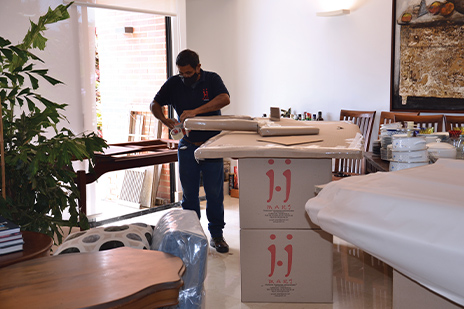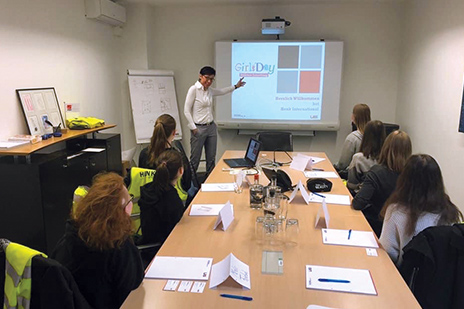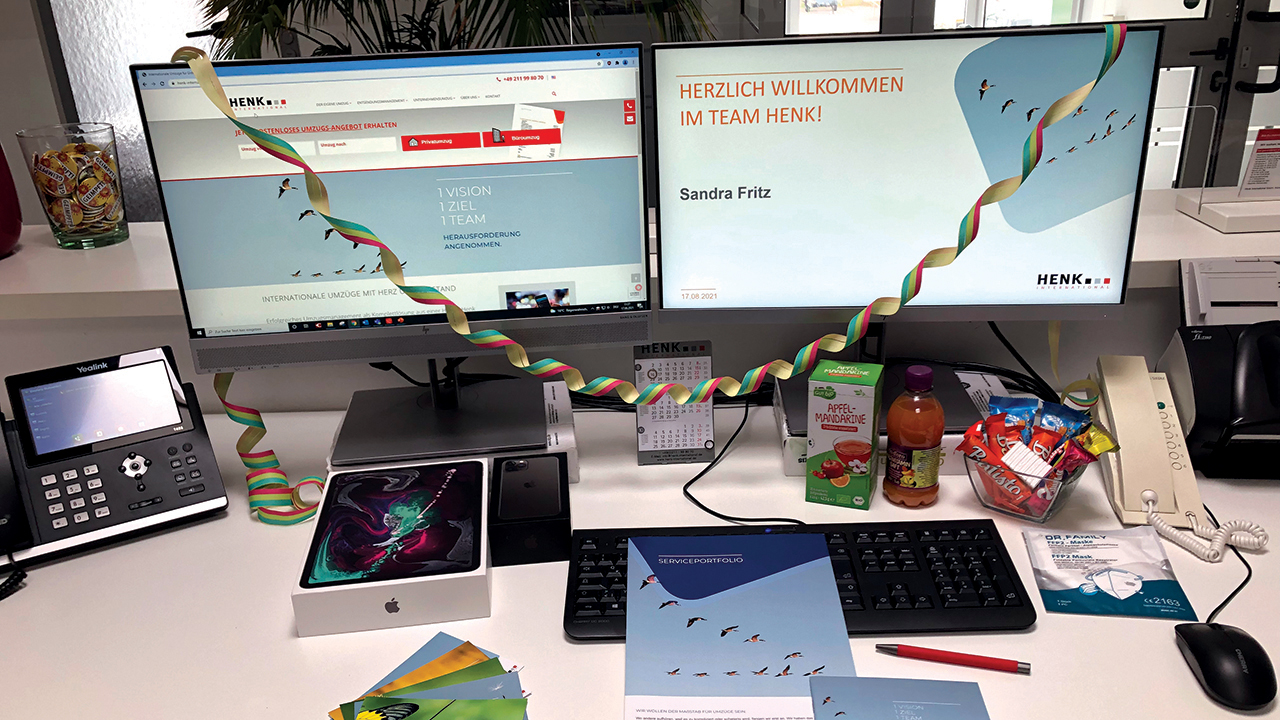Attracting and retaining good-quality staff is critical to a company’s performance and all-round sustainability – and, for movers, it is more difficult than ever. However, in a competitive market, there are straightforward steps firms can take to give them the best possible chance of recruiting high-calibre staff and increasing business longevity in the process. FIDI Focus Editor Dominic Weaver reports
The economic, social or environmental sustainability of any business starts with its people. How and who a company recruits, and how it empowers its staff, are the most important factors affecting its ethical credentials and bottom line.
However, it has never been tougher for movers to get it right. The availability of drivers, packers and administrative staff, to name just a few roles, is at an all-time low, and employers are having to fight hard to fill vacancies.
At Henk International, Managing Director Manuela Henk has noticed the change. ‘We have had searches out for two jobs for two or three weeks and had one application. This is really scary,’ she says.
Issues such as declining interest from prospective employees in doing physical work predate COVID-19, but the pandemic has accelerated this trend, while – at the same time – raising the importance of logistics and increasing competition for staff in this sector.
Against this background, Henk International is investing a lot of energy in finding the right people, but Henk says the most effective strategy is actually to limit this requirement as far as possible. ‘We are very innovative when we are recruiting, and are pushing this,’ she adds. ‘But, on the other hand, I don’t want to recruit, because it costs so much money and time, and so many people are involved. It’s more sustainable to keep staff so we don’t have to do this so much.’
A positive start
The process of keeping staff starts on their first day with the business. ‘When someone joins the company, everything is ready: their desk, email, phone, PC, car. They get tea, some sweets, a bottle of champagne and a card that says we are happy to have you as part of the team,’ Henk says. ‘Something that is easy to do makes such a difference to them.’
From here, the firm aims to provide a company culture in which people want to stay and are empowered to make decisions, without fear of recriminations if mistakes are made. This is critical to helping staff grow in their roles.
Henk says: ‘We encourage everyone to take responsibility and decisions – even if, in the end, they turn out to be wrong. It’s better to take a wrong decision, and learn, than not take any decision.’
At Dutch Affiliate De Haan, HR manager Helma Rutten-Reniers says a policy of ‘employees first, then customers’ is underpinned by good communication between all parties, alongside clear policies and procedures ‘so everyone knows what is expected of them’.
She adds that the business believes developing employees’ communication skills, both on the job and in training, is essential to building their ‘happiness and commitment’, and keeping them at the firm. De Haan will explore this further towards the end of the year as part of a ‘sustainable employability’ project designed to ‘ensure we, as an organisation, keep on growing together with our employees’.

Training is gaining
Juan José Marí, CEO at Venezuelan Affiliate JJ Marí, agrees that, with fast-paced changes occurring in the industry and the wider world, developing staff is critical. Sometimes this requires ‘unlearning’ and reinvention, he says, to replace outdated practices with up-to-date ones: ‘We face this challenge with continuous training in technical, behavioural and leadership skills, so we can adapt to new needs.’
Giving staff accountability and knowing each individual well is also key, says Marí. ‘The secret is to… give them participation and responsibility, develop them professionally,’ he adds, believing that recognising achievements, offering practical and academic opportunities to learn, and encouraging personal growth are important, too.
Have a purpose
Companies must have a strong sense of purpose, too, to attract people who fit well.
‘As an organisation, you need self-knowledge, to know where you want to be and what you need to achieve it,’ Marí says. ‘From there, it is very easy to determine who has the right attitude and qualifications to be a part of the team.’
Rutten-Reniers agrees and says the recruitment process should include more of a ‘comfortable conversation, rather than an interview’ to understand the person you are considering.
‘Be honest during the selection process,’ she says. ‘It is important that the candidate feels they can be themselves during an interview to see if there is an actual fit between their personality and our organisation.’
She adds that De Haan looks for ‘people, not experiences’ – while grades are important in the initial stages, making sure someone is a good fit is about more than this.
‘The person needs to be happy working within an organisation like ours, and needs to be willing to learn and develop,’ Rutten-Reniers says. ‘While experience is valuable, the person to us is more important.’
Henk agrees: ‘Technical qualification is not the most important point for us to make a decision. It’s their personality, values, mentality and character, which need to be a match for the company.
A two-way relationship
This, of course, works the other way around, too, and prospective employees are increasingly discerning when it comes to selecting companies for which they want to work. Many are now looking beyond remuneration and overall package – indeed, Henk says that perks such as free fruit for employees are now ‘standard’ – and are demanding that employers trade ethically and sustainably, and make a positive impact on the communities in which they operate.
Andrew Wilson, Group eCommerce and Marketing Manager at Grace, says: ‘Younger staff, in particular, are more choosy about who they want to work for. They want to work at organisations that take their social responsibilities seriously and contribute in other ways.’
‘We are very aware of the value of having staff who want to belong to our team and feel proud to be with us – and us with them,’ says Marí, who adds that having engaged and committed employees is a powerful marketing tool for the business. ‘Our own team are the best ambassadors and salespeople of who we are,’ he adds.
Tell the story
Companies must still work hard, however, to ensure they are letting prospective employees know about the work they are doing.

At Grace – which supports a nationwide Indigenous literacy project (see feature, pages 20-29), the St Vincent de Paul anti-poverty charity and other community initiatives – Wilson agrees. ‘It’s nothing if we don’t tell the story,’ he says. ‘when we tell the story, people within the business can feel good about it.’
Across Australia, Wilson adds, big businesses – from supermarkets to mining companies – have ‘realised they have got to have another dimension, both from a staff-engagement perspective and their outward reputation.’ Giving employees a strong sense that they are in a business that makes a difference can play an important role in an overall package that will keep them working hard and wanting to remain part of it for the long term.
Key tips for recruiting – and retaining – the best staff
By Henk International Managing Director Manuela Henk
1. Retain the staff you have already
‘This is where you have to start to improve your recruiting procedure. It takes time to bring someone to a level where they can really start working independently and take responsibility. The higher your staff turnover, the more people need to be involved in training, so, whenever you have someone new, it reduces the capacity of others.
‘It’s the same philosophy as with customers. It is easier and less expensive to keep a good customer than to get new customers. With staff, it is absolutely the same.’
2. Interest young people
‘In Germany, we have a programme to recruit young talent from school age, and girls and boys get the opportunities to understand jobs that are, respectively, predominately male or female.
‘We have set up a ‘Girls’ Day’ programme to show girls what we do, and we take five or six students every year. It is so important to make these young kids aware of how interesting our job can be on the operational and administrative side.’
Henk adds that, because of the project, they have recruited one employee directly after leaving school and another indirectly.
‘I’m convinced this will be the future for us – that we start to recruit from the early school years.’
3. Road test your recruits
Every new Henk employee takes part in a trial day, during which they meet colleagues-to-be and experience every part of the business.
‘They go through every department in our company – from reception to bookkeeping and our warehouse – so that they understand what this company is doing. It gives them the chance to look behind the scenes, to meet our people and talk to them.
‘Before we sign the contract, we take another couple of days – the applicant can decide if they still want to have this job and we discuss if we want to have this person. If we both think we’re a good match, this is the final proof.’
Henk adds that the trial day works well – and while this final stage usually leads to a job offer, it has – after feedback from staff – led to the company not taking on the prospective new recruit on at least one occasion.
4. Make yourself visible
According to Henk, giving yourself the best possible choice of applicants is about presenting the company in a positive light online – which, increasingly, is about getting your social media and recruitment channels right for your market.
‘A website is important, but it is also important that you are on the right platforms. You need to know what the good platforms are, as this is changing constantly. This means social media and other platforms for recruitment, such as [in Germany] Step Stone and eBay.’
With logistics work in higher demand than ever since COVID, Henk says they are now competing with industry behemoths such as Amazon for staff.
5. Create a culture
While raising salaries in places may help companies compete, Henk says the environment in which people work is becoming a growing focus.
‘I’m convinced that money is not the only reason; you have to give them kind of a home, where they really feel comfortable. So, we have to think about company culture a lot more during the next five years.
‘There are different things, too. We are probably going to start offering coaching to our staff members – not only to the middle and top management, but to everyone.’


